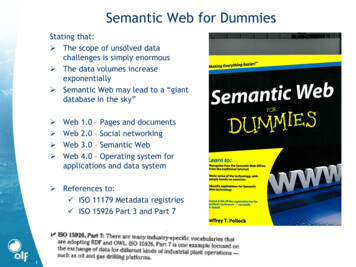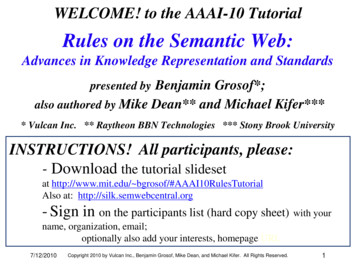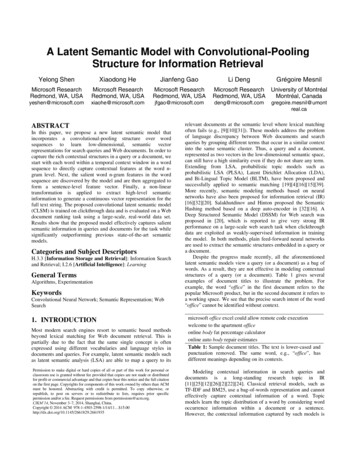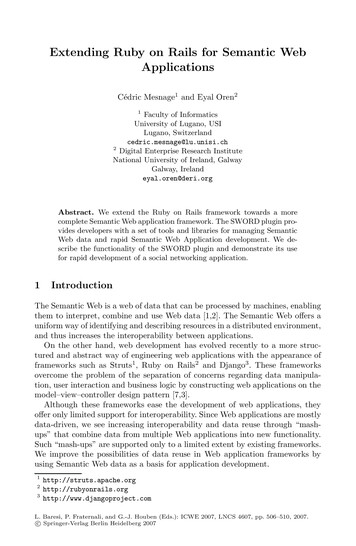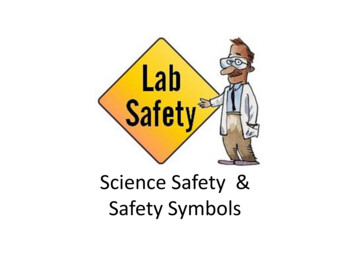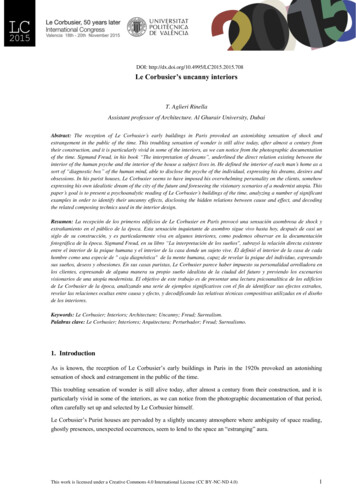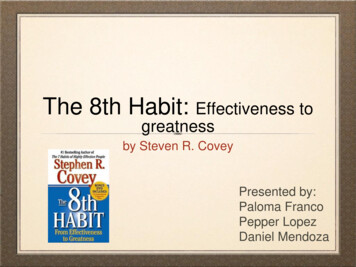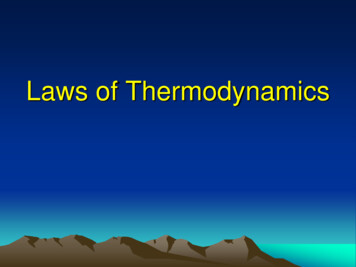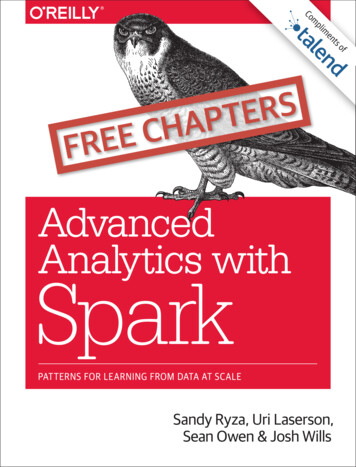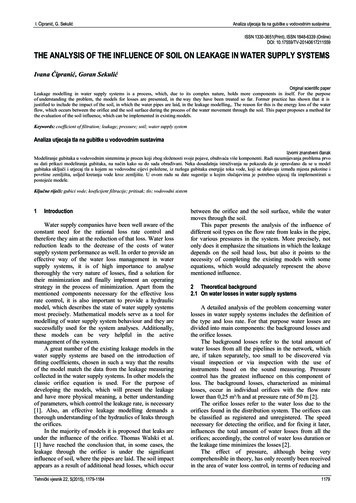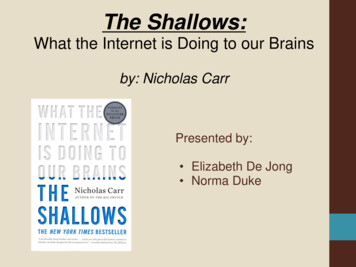
Transcription
The Shallows:What the Internet is Doing to our Brainsby: Nicholas CarrPresented by: Elizabeth De Jong Norma Duke
Nicholas Carr Reviews technology, culture, and economics Does IT Matter (2004) The Big Switch: Rewiring the World fromEdison to Google (2008) “Is Google Making Us Stupid?” AtlanticMagazine, 2008, July/August The Shallows: What the Internet is Doing toOur Brains (2010); Pulitzer Prize Finalist ingeneral non-fiction (2011) Columnist, author: 67 articles, in 21 differentpublications Editorial Board of Advisors for EncyclopediaBritannica B.A. Dartmouth College; M.A., in Englishand American Literature and Language,Harvard University
Carr’s Personal History Mac Plus; 2000 (1986) Word, Excel, Hypercard Paper and pencil; onscreen editing Modem; AOL (1990) “ trapped, not unhappily,in the ‘upgrade cycle’ ” Netscape browser (1995) Web 2.0 (2005); socialnetworking
Organization of Presentation Norma Elizabeth Prologue: The Watchdog and theThief Chapter 01: Hal and Me Chapter 02: The Vital Paths Chapter 08: The Church of Google Chapter 09: Search, Memory Chapter 10: A Thing Like Me Other Sources Chapter 03: Tools of the Mind Chapter 04: The Deepening Page Chapter 05: A Medium of the MostGeneral Nature Chapter 06: The Very Image of aBook Chapter 07: The Juggler’s Brain
Prologue: The Watchdog and the Thief Marshall McLuhan: Understanding Media: TheExtensions of Man (1964) Prophesied dissolution of linear mind; “The mediumis the message.” “When people start debating (as they always do)whether the medium’s effects are good or bad, it’s thecontent they wrestle over.” “ medium’s content matters less than the mediumitself in influencing how we think and act ” “The content of a medium is just ‘the juicy piece ofmeat carried by the burglar to distract the watchdogof the mind.’” (Carr, quoting McLuhan)
Chapter 01: HAL and Me Stanley Kubrick (1968) HAL9000; “I can feel it.” Get fidgety, lose the thread,begin looking forsomething else to do Deep reading has become astruggle “Once I was a scuba diverin the sea of words. Now Izip along the surface like aguy on a Jet Ski.” Maybe I’m an outlier ?
Advantages are Real Nicholas Carr: uses the Web – a lot! Clive Thompson: “The perfect recall of siliconmemory can be an enormous boon to thinking.” Scott Karp: “ we can’t yet recognize thesuperiority of this networked thinking processbecause we’re measuring it against our old linearthought process ” Philip Davis: “More connections to documents,artifacts, and people means more external influenceson my thinking and thus on my writing.” “ silly like sewing your own shirts or butcheringyour own meat.”
Beware “For the last five centuries, ever since Gutenberg’sprinting press made book reading a popular pursuit, thelinear, literary mind has been at the center of art, science,and society.” nGenera study: 6000 members of “Generation Net”;affected the way they absorb information; eye movementswhile reading a page Katherine Hayles: Students not reading whole books(literature degrees) Bruce Friedman: “I can’t read War and Peace anymore”.
Scott Karp Scott Karp: “What if Ido all my reading on theweb not so muchbecause the way I readhas changed, i.e. I’mjust seekingconvenience, butbecause the way ITHINK has changed?”
Chapter 02: The Vital Paths Friedrich Nietzsche (1882);Danish Malling-HansenWriting BallThe writing ball is a thing likeme: made of ironYet easily twisted on journeys.Patience and tact are required inabundance,As well as fine fingers, to use us. “Our writing equipment takespart in the forming of ourthoughts.”
Historic Viewpoint Sigmund Freud: neurophysiologist; many cells &contact barriers (1895) William James: psychologist; “seems endowed with avery extraordinary degree of plasticity” (1890) Santiago Ramon y Cajal: Spanish physician,neuroanatomist (Nobel Prize, 1906)– “In the adult brain centres, the nerve paths are somethingfixed, ended, immutable. Everything may die, nothing maybe regenerated.” (1913) Industrial Age; brain as a mechanical contraption “Since the brain could not change, human nature,which emerges from it, seemed necessarily fixed andunalterable, as well. (Norman Doidge, 2007)
Michael Merzenich Doctorate in physiology fromJohns Hopkins (1968)– 2001: A Space Odyssey (1968)– Neil Armstrong, Edwin “Buzz”Aldrin, Jr.: Apollo 11 (July 20, 1969) Mapped six monkeys’ hands;severed sensory nerve;allowed heal; signals crossed Few months later gone! “These results are completelycontrary to a view of sensorysystems as consisting of aseries of hardwiredmachines.” (1983)
Eric Kandel Nobel Prize (2000)Sea slug: Aplysia californicaTouched gill, lightly, 40x“Showed dramatically thatsynapses can undergo largeand enduring changes instrength after only arelatively small amount oftraining.” Empiricists: learn viaexperience Rationalists: built-intemplates
Michael Bernstein & Edward Taub Edward Taub: behavioralneuroscientist, University ofAlabama at Birmingham Michael Bernstein: eye surgeon Increasingly severe stroke overfew days in hospital; age 54 Traditional program of physicaltherapy; left hand crippled, leftleg needed cane Routine tasks performedrepeatedly Coax neurons and synapses toreconnect
Genius of the Brain Mark Hallett, head ofMedical Neurology Branchof NIH: “We have learnedthat neuroplasticity is notonly possible but that it isconstantly in action.”(2005) Nicholas Carr: “The geniusof our brain’s constructionis not that it contains a lotof hardwiring but that itdoesn’t.” (2010)How Does the Teenage BrainWork?Powell, K. (2006). Nature 442,865-867.
Diagram of a Nerve Synapse
Diagram of a Neuron
There are times
Chapter 3Tools of the Mind
Intellectual Technology Examples-typewriter, globe, book, newspaper,library, computer, internet Theories of thought– Determinists vs. Instrumentalist
Our interaction with technology Changes over the years Historical record of writing Hieroglyphics-written Plato-spoken
Chapter 4 Deepening Page History of the Written WordSumerians, EgyptiansStyleEducational structureShift
Chapter 5 Medium of the MostGeneral Nature Universal Machine Technologyadvancements Internet UsageComparison2005Adults6 hrs. per week200912 hrs. per weekChildren11 hrs. per week
Average American rec’d400 texts per monthAverage teen 2,272 text per month2009
TV & Internet Habits 2008-2009 TV viewingaverage 153 hrs. a month 2006 study TV & Internetoverlap 42% of avid TV fansspends 30 hrs. online 2009 Ball State Study 8.5 hrs. viewing TV,computer screen ormobile phone oftenat same time. 2008 AdweekMagazine Study Observed 4 typicalAmericans, noprint mediaconsulted.
Print usage down“old” technology loses cultural impactAccess methods changing, so is our understandingInfluences depth of understanding & degree of attentionPresentation styles change to accommodate19842012
Good Housekeeping May 1955Good Housekeeping May 1955Good Housekeeping April 2010
Magazines, newspapers shorterarticles with more graphics,less text. Decreasing newspaper circulation TV viewing-crawler Cable TV viewing multiple channelsat same time 2009 National Symphony tweetsduring performance NY Philharmonic & IndianapolisOrchestra encouraged audience tovote on encore via text
Chapter 6 At time ofbook publicationdigital booksnot as popular. As of May, 2011 Ebooksoutsold printImage of a Book First Kindle2007 Newsweekcalled Kindle“cultural revolution” NY Times Book Review“seductive whitegizmo”
Future of Reading Books WSJ said the Kindle “can help return to us our attentionspans and extend what makes books great: words andtheir meaning.” Failure to see how a change in a medium’s format alsochanges its content. Senior VP of Harper Collins “we need to take advantageof the [Kindle] medium and create something dynamic ”
Writing Style Changes 2001 Japanese “cell phone novels” By 2007, top 3 Japanese novelswere written on cell phones. Vooks Social media incorporated intodigital readers. Traditional books designed forattentive reader Books are still common place, butinteraction methods altered. Contemplative reading is becomingrarer.
Chapter 7 The Juggler’sBrain Science of Neuroplasticity-what goes on in the brain The internet’s impact on the mind. Research indicates consistent Net activity alters brain. “Internet seizes our attention only to scatter it.”(Pg. 118)
Extensive Brain Studies 2008 UCLA study (2008) brain responseto Net use. Brain scans experienced web surfers vs. novices. Novices 1 hr. per day on line. Within 6 days brain scans similar to heavy Netusers.
Digital documents vs. paper Hypertext increased cognitive load weakeningcomprehension. 1989 study hypertext readers clicked throughpages instead of reading carefully. 1990 experiment hypertext readers often couldnot remember what they had read
Comprehension and Multi-mediapresentation Study for Media Psychology in 2007 Comparison of text presentation vs. multivideo visual presentation. Text viewers scored higher, saying theyfound presentation, multi media version saidthey didn’t learn anything. Cornell & Kansas State studies foundmore distractions less memory.
Pictures and audio enhance learning Brain uses different and separate means ofprocessing hearing seeing effects focusing ability. Example: Constant email checking. 2006 study Net users skim text Most web pages are viewed 10seconds or less. How do users read on the web? Conclusion: They don’t.
2003 Ziming Liu, professor at San Jose University impact of digital documents on reading subjects well educated people (engineers,scientists, teachers, grad students) reading habits changed in 10 years. 85% reading more digital documents, 81%said they were scanning & browsing 82% reported more non-linear reading.Only 27% indicated that there in-depthreading increased, 45% said it was declining Conclusion more topics explored, but atsuperficial level and hyperlinks distractedpeople from reading and thinking deeply People still reading, but they readdifferently today
Benefits of Net usage Better hand-eye coordination, reflexresponse, and processing of visual cues. 2003 Nature study & video gaming After 10 days of play spatialrecongination skills. Conclusion video gaming “capable ofradically altering visual attentionprocessing”
Benefits Increased evaluation skills Increased working memory Increased workplace value (becausejob depends on our ability to connectquickly)
Problems Jordan Grafman, head of Cognitiveneuroscience unit at the National Institute ofNeurological Disorders and Stroke believesthat “improving our ability to multitaskactually hampers our ability to think deeplyand creatively.” In 2009 Science article reviewed 50 studies on the effects of media typeson intelligence and learning ability. Conclusion “every medium developssome cognitive skills at the expense ofothers.”
2009 Stanford Study Heavy media multi-taskers vs relativelylight multi-taskers. Heavy multi-taskers were much moreeasily distracted & had less workingmemory and lower concentrationlevels.
Technology & typical family outing
Chapter 08: The Church of Google Frederick Winslow Taylor Midvale Steel, Philadelphia(1878) Machine shop laborer tomachine shop foreman; researchdirector, chief engineer of works Realized men on line were notworking to full potential Broke each job down intosequence of steps; createdprecise instructions Employees grumbled, nocreativity but profits soared
Neil Postman Technopoly (1993) Taylorism founded on sixassumptions: Primary goal of human thought andlabor is efficiency Technical calculation superior tohuman judgment Human judgment cannot be trusted Subjectivity obstacle to clearthinking What cannot be measured either doesnot exist or is of no value The affairs of citizens are best guidedand conducted by experts
Larry Page and Sergey Brin Founders of Google (19951996) Larry Page: links on Webpages analogous to citations inacademic papers; signify value Not all links created equal Authority of Web page gaugedby number of incoming links The greater the authority of aWeb page, the greater theworth of its outgoing links Database of all links on Web Sergey Brin; math prodigy
Googleplex “Googleplex is the Internet’shigh church, and the religionpracticed inside its walls isTaylorism.” (Carr; page 150) Founded on science ofmeasurement; try to quantifyeverything Way sites look and operate;how long users stay on apage, way they move cursor,what they click on, what theydon’t click on, where they gonext Volunteers for eye-tracking
Google Tracking Your Eyes “Our User Experience Researchteam has found that peopleevaluate the search results pageso quickly that they make mostof their decisionsunconsciously.” “We use eye-trackingequipment in our usability labs.This lets us see how our studyparticipants scan the searchresults page, and is the nextbest thing to actually being ableto read their minds.” Anna Aula, Kerry Rodden
Funding Google Venture capitalist (1998) Decided to auction advertisingspace; modest compromise ofideals (2000) AdWords: two criteria– Size of bid– Frequency of user clicks Ensured relevance to topics ofsearches More clicks would result inmore prominence on futurepages Advertisers paid Google byclick; revenues soared
Google’s Search Engine Success Earlier search engines gotclogged with data as Webexpanded Google’s engine producesbetter results as Web expands;more sites and links lead tomore precisely classifiedpages; ranks Increased traffic allowscollection of more behavioraldata Invested billions of dollars Shapes our interaction withcontent
Irene Au Head of User Experience;Google “Our goal is to get users in andout really quickly. All ourdesign decisions are based onthat strategy.” Faster usage means moreopportunities for Google tocollect information about us, asthe user, and to feed usadvertisements Advertisements most likely tograb our attention
Impact of Social Networking Quality of page now only one of200 considerations Google identifies new or revisedWeb pages much more quickly Checks popular sites every fewseconds; skews results to favornewer over older Can bypass “quality” entirely Diversification of Google Digitize ever more types ofinformation, move that ontoWeb, feed database, classify andrank; snippets (with ads )
The Machine in the Garden Leo Marx (1964)– Machine: efficiency of informationexchange– Garden: enlightenment contemplation,introspection “The development of a wellrounded mind requires both anability to find and quickly parsea wide range of information anda capacity for open-endedreflection.” “The problem today is thatwe’re losing our ability to strikea balance ” Carr, page 168
Things I Have Left Out All discussion of Google Books “For Google, with its faith inefficiency as the ultimate good andits attendant desire to get users inand out really quickly, theunbinding of the book entails noloss, only gain.” (Carr, page 165) Larry Page: (2007); “ your DNAis about 600MB, compressed;much smaller than Linux orWindows; your programalgorithms probably aren’t thatcomplicated; probably more aboutoverall computation ”(paraphrased)
Chapter 09: Search, Memory “Socrates was right. Aspeople grew accustomed towriting down their thoughtsand reading the thoughtsothers had written down,they became less dependenton the contents of theirown memory.” “But that wasn’t the wholestory ” Carr, page 177
Desiderius Erasmus Dutch humanist; De Copia(1512) Stressed the connectionbetween memory andreading Recommended that everyreader keep a“commonplace” notebook,for recording memorablequotations organized bysubject, appropriate sections
Twentieth Century Educators bannedmemorization from classroom;viewed as barrier toimagination, waste of time “Net quickly came to be seen asa replacement for, rather thanjust a supplement to, personalmemory.” (Carr, page 180) Don Tapscott: “Why should wespend agonizing hours in schoolmemorizing long passages orhistorical facts when you canlook them up in an instant?”
Back to Eric Kandel experiments on Aplysiacalifornica sea slugs “We could see for the first timethat the number of synapses inthe brain is not fixed – itchanges with learning!” “The fact that a gene must beswitched on to form long-termmemory shows clearly thatgenes are not simplydeterminants of behavior butare also responsive toenvironmental stimulation, suchas learning.”
Areas of Human Brain Consolidation of explicitmemories; both cerebral cortexand hippocampus Initial memory stored in corticalregions (auditory, visual ), andhippocampus Hippocampus helps stabilizememory in cortex; finallyerased from hippocampus Hippocampus also responsiblefor weaving together; oldmemories with newer ones When our sleep suffers, ourmemory also suffers
Computers and Brains Kobi Rosenblum; Departmentof Neurobiology and Ethology,University of Haifa, Israel: “Theprocess of long-term memorycreation in the human brain isone of the incredible processeswhich is so clearly differentthan ‘artificial brains’ like thosein a computer.” Computer memory exists assimple binary bits – ones andzeros, connected together viaelectrons in circuits
Memory “The proponents of theoutsourcing idea also confuseworking memory with long-termmemory not ‘freeing up’ spacein his brain for other functions.” Kandel: “For a memory topersist, the incoming informationmust be thoroughly and deeplyprocessed. This is accomplishedby attending to the informationand associating it meaningfullyand systematically withknowledge already wellestablished in memory.”
Cascade, leading to memory Conscious attention begins infrontal lobes Establish attention; cortex sendssignals to neurons in midbrain Midbrain producesneurotransmitter dopamine Neurons from midbrain reachdown into hippocampus, funneldopamine Explicit memories begin forming;genes start forming new proteins Some antibiotics stop formationof proteins; block formation oflong-term memories
The Decision is Yours David Foster Wallace(2005) “’Learning how to think’really means learning howto exercise some controlover how and what youthink. It means beingconscious and awareenough to choose what youpay attention to and tochoose how you constructmeaning from experience.”
Digression: Writing this Book Moved from Boston suburbs tomountains of Colorado No cell phone service, DSLconnection Internet; cancelledTwitter; mothballed Facebook,blog Shutdown RSS reader, curtailedSkyping and instant messaging Changed e-mail habits!!! Backsliding already Blu-ray player with Wi-Fi;streaming from Pandora, NetFlix,YouTube it’s cool
Chapter 10: A Thing Like Me Joseph Weizenbaum: computerscientist at MIT; ELIZA Simple rules English grammar Identify salient word, phrase Transform sentence into a newsentence, appeared to beresponse Rogerian psychotherapist MIT; national plaything; hissecretary; psychiatrists andscientists jumped on board Carl Sagan: “network ofcomputer therapeutic terminals”
Can Machines Think? Alan Turing: ComputingMachinery and Intelligence(1950) Could person distinguish the“computer” from the “liveperson”? With ELIZA, people wanted tobelieve machine had humanqualities could think Weizenbaum: Computer Powerand Human Reason (1976) Self-awareness and the courageto refuse to delegate
The Price We Pay “The tools of the mindamplify and in turn numb themost intimate, the mosthuman, of our naturalcapacities – those for reason,perception, memory,emotion.” “Whenever we use a tool toexert greater control over theoutside world, we change ourrelationship with that world.”Marshall McLuhanUnderstanding Media: TheExtensions of Man (1964)
Nicholas G. Carr Websites:
The Original Article
The Other Viewpoint:Bavelier, D., & Green, C. S.Neuroscience: Browsingand the brain.Nature, 470(7332), 37-38.Bilton, N. (2010).I live in the future & here'show it works: Why yourworld, work, and brain arebeing creatively disrupted.
Scientific American MIND Supertaskers and the MultitaskingBrain; David Strayer, Jason Watson March/April issue, 2012; page 22 Cell phone on attention to driving;most people are drastically reduced,may even be worse than legal“impaired limit” for alcohol Most multitaskers actually worse Identified a very few abnormalities,who can multitask with ease Searching for genetic andphysiological support for differences
Another Possibility Don Tapscott (2009) Media, Technology, Innovation Adjunct Professor of Management;B.Sc. In Psychology and Statistics;M.Ed. in Research Methodology nGenera founder (1993) 4.5 million dollar research study ofover 11,000 young people andexamines how the net generation ischanging the world and all of itsinstitutions
Closing Thoughts
Nicholas Carr and Jimmy Wales 5-minute snippet ofdebate between author ofthis book, Nicholas Carr,and founder ofWikipedia, Jimmy Wales Debate occurred atDePauw University;March 30, 2011
Book Chapter 07: The Juggler’s Brain Prologue: The Watchdog and the Thief Marshall McLuhan: Understanding Media: The Extensions of Man (1964) Prophesied dissolution of linear mind; “The medium is the me

